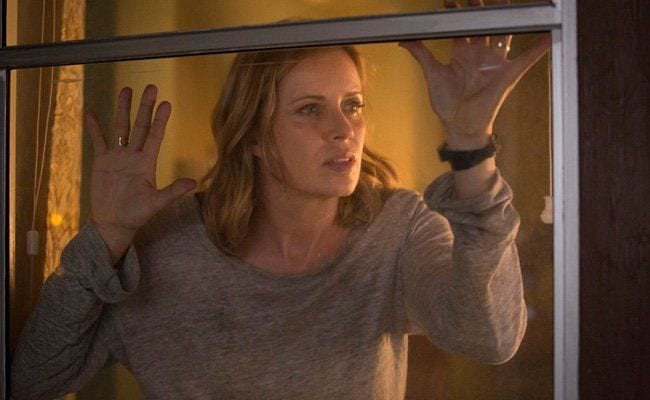
Fear the Walking Dead’s fourth episode, “Not Fade Away”, opens to the strains of Lou Reed’s “Perfect Day”. The allusion sets the mood: happy relaxation tinged with something more sinister beneath. Although Reed sings lazily of “sangria in the park”, that wistful feeling turns bitter as the song continues, especially in lines like “you made me forget myself / I thought I was someone else/ someone good.”
In the same way, life in L.A. seems relatively tranquil for Travis Manawa (Cliff Curtis) and his family, at least in the episode’s early scenes. We find Travis out for his morning run; Nick (Frank Dillane) lounges by the pool; Chris (Lorenzo James Henrie) films the surrounding landscape from the rooftop. In fact, these scenes play as though the show has gone back in time, to before the crisis began.
Eventually, however, the camera pulls back from to reveal that Travis’s “routine” run takes place against a backdrop of burned out, empty houses and yards full of debris. The pool where Nick lounges needs tending. Meanwhile, Madison (Kim Dickiens) insists that the living room needs yet another coat of paint to cover over the bloodstains that still remain from the walker Daniel (Reuben Blades) killed in episode three. Life seems to have returned to normal –- or at least the new normal: they can’t have power round the clock, but air conditioning remains available at regular intervals. Like the blood beneath that new coat of paint, though, bad things lurk beneath the seeming normalcy.

These allusions and metaphors are all well-placed; however, the structural, or what I might term “literary”, quality of Fear the Walking Dead has been beyond reproach from scene one. The problem is, literary value, is only engaging to a point. The real question still remains, “can this series hold our attention?” –- a question at least partially tied up in whether it can distinguish itself from its hugely successful predecessor. This new episode does offer some hope on that score. In fact, “Not Fade Away” suggests that the show might be able to honor its literary ambitions and its audience expectations at the same time. The choice of “Perfect Day”, for example, is not only an apt allusion, it offers Fear the Walking Dead its own original motif for the first time: a contradiction between apparent normality and underlying dysfunction.

A particularly telling aspect of this episode is the complete absence of walkers. After their initial scare, Travis, Daniel, Madison, and the others have managed to find a haven of sorts. Yet, in order to achieve this, they have accept being walled in behind chain link fences topped with barbed wire. While self-imprisonment may sound familiar to Walking Dead fans, the “dangers” here are less the walkers outside the perimeter than the military who patrol that fence under the guise of protecting the citizens. At one point, when Madison steals into a neighborhood just outside the haven, she must hide beneath a car –- not from walkers but from a military unit coming over the hill. Fear and the nature of the “enemy” shift in this moment. Late in the episode, Daniel points out that it’s “because of fear” that men turn on one another, and for the first time the title of the series makes sense. It is not the walking dead, but rather the fear of them that will drive the action. Perhaps the walking dead are less an enemy and more an excuse, in the same way terrorism can be an excuse, for us to mistreat one another.

One important image tied to this theme is Chris’s video camera. We’ve seen it before: Chris was originally embroiled in the downtown riots because he was so keen to document what he thought was police brutality. But then, that’s the trouble with video, isn’t it? On the one hand, it seems to offers us a slice of reality; on the other, what we see is distanced and mediated. We can never quite be sure what it is we’re seeing. Chris’s camera also captures something in this episode, something that suggests the military may have shady intentions. But, of course, just what he’s captured remains in doubt, with his father insisting it must be just a trick of the light.

The real importance of Chris’s camera, however, is the way it moves the action, in a meta-textual sense, beyond the series itself. During these scenes, the show becomes about what it means to document as opposed to live through these events. Therein lies the show’s most interesting move so far. Because if it is fear that drives these and leads to their actions, far more than the actual danger of the walkers themselves, then the camera is not so much focused on the future (as it is in The Walking Dead) as it is focused squarely on us.
Could Fear the Walking Dead become the commentary for a post-Ferguson world that Battlestar Galactica was for a post-9/11 world? Too soon to tell. But “Not Fade Away” is a step in the right direction.

